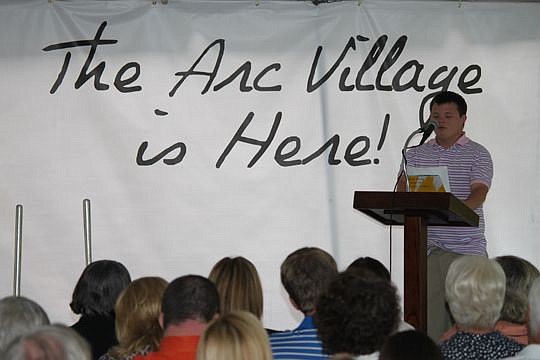
This time next year, Collin Hazelip could have his own place.
A place to work, eat and hang out with his friends, as he describes it. Video game sessions or maybe host a Super Bowl party — especially if the fortune of the Jacksonville Jaguars changes.
“I always wondered what it would be like to have my own place,” he said. ”I never knew it would be possible to live on my own.”
Hazelip has Down syndrome. At 20, he lives at home and is becoming more of an adult — he’s had a job for four years and plans to attend the University of North Florida. But his housing options, as they are with other adults with developmental disabilities, have historically been limited.
Staying at home is one possibility. Group homes have been commonplace. Decades ago, institutionalization was an option.
“We want the best for these kids,” said Sally Hazelip, executive director of the North Florida School of Special Education and Collin’s mom. “It’s so different than it was 50 years ago.”
Next year, there will be another option for Hazelip and many others looking for that sought-out independence.
The Arc Village held a groundbreaking ceremony Wednesday near a 32-acre site near Hodges and Beach boulevards. It’s mostly trees now, but over the next year it will start to become an affordable, safe community for adults with developmental disabilities to live independently.
Construction and development will be in excess of $18 million, partially coming from Florida Housing Finance Corp. tax credits, state funds and donors. The land was donated to the state in 1969 by the Hodges family, but became fully available to the organization in the past several years.
The community will have one- and two-bedroom homes, a community center and outdoor facilities among other amenities.
It will be able to accommodate about 120 residents, none of whom have yet been selected. The first residents are expected to call it home in fall of next year.
Like Hazelip, Michael Cox’s son, Andy, wants his own place.
“I can clean. I can cook. I have a job. I just want my own place,” Michael Cox told the group Wednesday. “That’s what my son said to me Saturday morning as we were making breakfast.”
Cox, director of group underwriting at American Heritage Life Insurance, said Andy hugs him and his wife, Mary, each morning. He hugs them goodnight each night.
“He loves us dearly. He wants out,” Michael Cox said, which caused the crowd to erupt in laughter.
Others like Hazelip and Cox shared stories of what The Arc Village meant and the possibilities it brings for people with developmental disabilities. Arc Jacksonville is the organization behind the community. It serves the developmentally disabled population to help them realize full potential and participation in community life.
The yearning for independence was apparent almost 10 years ago, when Arc Jacksonville President and CEO Jim Whitaker began asking about possibilities for that land. A common answer of independent living kept popping up.
After years of wrangling in the Legislature and a fundraising campaign, the idea progressed and ultimately is at the point of becoming a reality.
When residents move in, staff will be on hand to provide assistance in emergencies. The $1.4 million annual operational cost will be provided by gifts from local businesses and organizations.
The loss of a job or loved one also can cause a financial hardship for the residents. Knowing that, a $1 million endowment fund has been created to assist during tough times. Delores Barr Weaver and David and Linda Stein each contributed $500,000 for the fund. Whitaker said he hopes one day it could be increased up to $3 million.
On Wednesday, though, it wasn’t about hardships — just possibilities.
After the ceremony, Hazelip was joined by Tate Loftis, his friend and possible roommate in the development. But there are limits to being a roommate.
“I’m not tying your shoes,” Hazelip said.
“You need to tie my shoes,” Loftis responded.
“I’m not tying your shoes,” again was the response.
Throughout the exchange, laughs and giant smiles. Loftis spent a weekend with Hazelip and the family, Sally Hazelip explains. Loftis doesn’t tie his shoes and requested some help — and now it’s a running joke between the two.
Already acting like roommates.
@writerchapman
(904) 356-2466